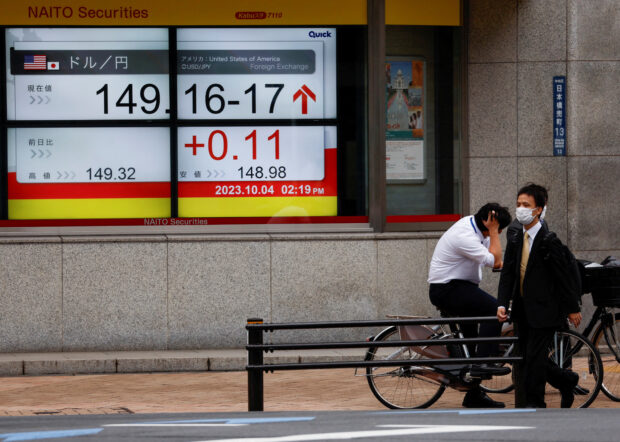
Passersby walk past an electric monitor displaying the Japanese yen exchange rate against the U.S. dollar outside a brokerage in Tokyo, Japan Oct 4, 2023. REUTERS/Issei Kato/File photo
SYDNEY – Asian shares hit one-year lows Monday as the risk of a wider conflict in the Middle East clouded sentiment in a week laden with data on U.S. growth and inflation as well as earnings from some of the world’s largest tech companies.
Bonds were also under pressure as U.S. 10-year Treasury yields crept to within a whisker of 5 percent, pushing borrowing costs up across the globe and testing equity valuations.
Washington warned over the weekend of a significant risk to U.S. interests in the region as ally Israel pounded Gaza and clashes on its border with Lebanon intensified.
The European Central Bank and Bank of Canada also hold policy meetings and, while no hikes are expected, investors will be sensitive to guidance on futures moves.
A recent surge in bond yields has tightened monetary conditions without the central banks having to do anything, allowing the Federal Reserve to signal it will likely stay on hold at its policy meeting next week.
READ: U.S. 10-year Treasury yields hits 5% for first time since 2007
Indeed, futures imply around a 70-percent chance the Fed is done tightening for this cycle and are flirting with the chance of rate cuts from May next year.
The jump in yields has challenged equity valuations and dragged most of the major indices lower last week, while the VIX ‘fear index’ of U.S. stock market volatility hit its highest since March.
Early Monday, both S&P 500 futures and Nasdaq futures added 0.3 percent, though U.S. 10-year Treasury yields were up at 4.946 percent and edging back toward 5 percent.
MSCI’s broadest index of Asia-Pacific shares outside Japan slipped 0.1 percent to be near its lowest in almost a year. Japan’s Nikkei eased 0.4 percent, as did South Korea’s market.
Hopes pinned on tech majors
Investors will be hoping earnings from U.S. tech majors will provide some relief this week with Microsoft, Alphabet, Amazon and Meta Platforms all reporting. IBM and Intel are also on the docket.
Profits should be supported by the strength of consumer demand with figures on U.S. gross domestic product this week expected to show annualized growth of a heady 4.2 percent, and nominal growth possibly as high as 7 percent.
“At the same time, last quarter’s modest rise in hours worked points to a strong productivity gain and surge in corporate profits,” wrote JPMorgan chief economist Bruce Kasman in a note.
“As corporate and household income share the benefits of this nominal activity surge, the underlying resilience of the U.S. private sector is being reinforced.”
This U.S. outperformance has underpinned the dollar, though the threat of Japanese intervention has capped it around 150.00 yen at least for the moment. The dollar was last trading at 149.85 yen, just below the recent peak of 150.16.
The euro was flat at $1.0588, while the Swiss franc held firm at 0.8927 per dollar having benefited from safe haven flows over the past couple of weeks.
Gold has likewise attracted a safety bid to stand at $1,976 an ounce, having hit its highest since May last week.
The risk of disruptions to supplies from the Middle East has underpinned oil prices, though Brent did run into resistance around $93.80 last week.
Brent was last down 43 cents at $91.73 a barrel, while U.S. crude eased 39 cents to $87.69.